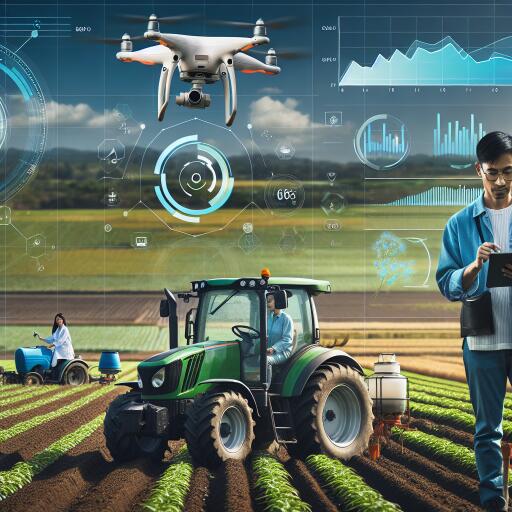Precision Farming: Revolutionizing Agriculture through Data and AI
In an era where the global population continues to soar, the agricultural sector is under immense pressure to escalate its food production capabilities. Traditional farming practices, while having served humanity for centuries, are increasingly unable to meet these intensified demands. This is where precision farming comes into play—a paradigm shift in agricultural practices, emphasizing the use of data gleaned from advanced machinery and sensors to optimize farming operations. Precision farming is not just an innovative approach to agriculture; it’s a necessary evolution to ensure food security and sustainability for future generations.
At its core, precision farming is about collecting and analyzing vast amounts of data to make informed decisions that enhance crop yields, minimize environmental impact, and increase the efficiency of resource use. This data-driven methodology employs a wide range of technologies, including GPS, remote sensing, and IoT (Internet of Things) devices placed both on-field and off-field. These technologies work in unison to monitor plant health, soil conditions, climate variations, and more, providing farmers with the insights needed to tailor their farming practices to the unique needs of each crop and plot of land.
However, the sheer volume of data generated through these technologies presents its own set of challenges. This is where Artificial Intelligence (AI) and Machine Learning (ML) technologies step in, offering powerful tools for the smart processing and analysis of agricultural data. AI and ML can sift through mountains of data to identify patterns, predict outcomes, and recommend precise actions, making them invaluable allies in the quest for more efficient and sustainable agriculture.
Applications of AI and ML in precision farming are numerous and varied. For instance, machine learning algorithms can analyze drone-captured images to detect early signs of disease or pests in crops, enabling farmers to take preemptive actions. Similarly, AI can optimize irrigation schedules based on weather predictions and soil moisture levels, conserving water while ensuring crops receive the hydration they need. From seeding to harvesting, every phase of the agricultural cycle can benefit from the insights provided by these advanced technologies, leading to considerable improvements in both yield quality and quantity.
Moreover, precision farming has significant environmental benefits. By enabling more targeted use of fertilizers, pesticides, and water, it reduces waste and minimizes the ecological footprint of farming operations. This not only conserves precious resources but also mitigates the effects of agricultural practices on climate change, presenting a win-win scenario for both farmers and the planet.
Despite the clear advantages of precision farming, its adoption is not without challenges. The high cost of technology, the need for digital literacy among farmers, and concerns about data privacy and security are significant barriers. However, as technology becomes more affordable and accessible, and as digital literacy rates among the agricultural community improve, these obstacles are gradually being overcome. Additionally, ongoing research and development in the field of agricultural technology promise even greater advances, with the potential to further streamline the implementation of precision farming practices.
The integration of AI and ML into precision farming represents a pivotal moment in agricultural history. By harnessing the power of data and advanced analytics, precision farming offers a promising path toward enhancing food production in a sustainable manner. As we move forward, the continued evolution of these technologies and their increasing adoption worldwide will play a crucial role in meeting the global food demand, marking a new dawn in the age-old practice of farming.
In conclusion, precision farming embodies the innovative spirit of modern agriculture. It leverages cutting-edge technologies to optimize the use of resources, improve crop yields, and reduce environmental impact. While challenges remain in its widespread implementation, the benefits it brings to the table make it a cornerstone of future farming practices. As we strive to feed an ever-growing population, precision farming, powered by AI and ML, shines as a beacon of hope, offering a smarter, more sustainable way to farm. The future of agriculture is here, and it is precisely targeted, data-driven, and smarter than ever before.









